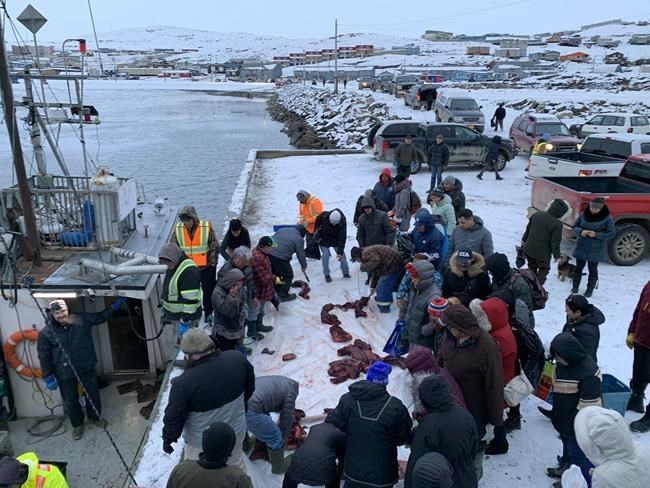
Iqaluit residents get their share of freshly caught walrus after the community's annual walrus hunt wrapped up a successful harvest on Wednesday, October 28, 2020. THE CANADIAN PRESS/Emma Tranter
November 01, 2020 - 7:00 AM
IQALUIT, Nunavut - A man slides a walrus flipper the size of his arm into a black garbage bag and ties it up with a grin.
A woman carefully handles a set of ribs, tucks them into a grocery bag and places them in a cooler.
It's an hour before sunset in Iqaluit and a group of walrus hunters has just returned to hand out the fresh catch to the community.
Trucks line Iqaluit's causeway and residents stand — plastic bags, buckets and coolers in hand — ready to greet The Black Jet, one of the walrus hunter's boats.
Crew members fill deep plastic buckets with pieces of walrus, or aiviq in Inuktitut. The meat is hauled up from the boat's belly using pulleys, then dumped onto a thick sheet of plastic that covers the dock's snowy surface.
There's no pushing or fighting over cuts of meat. Elders are given priority. Hunters personally pack bags of the best pieces for them to enjoy.
Nearly 100 residents pass through over the next hour to collect the meat. Shouts of "Nakurmiik!" or thank you, ring over the slosh of walrus meat spilling out bucket by bucket.
Some of the most sought-after pieces are the intestines and stomach, because they can contain mollusks, which are considered a delicacy.
Before the meat reaches residents, conservation officers test the catch for trichinella, which is caused by a parasite sometimes found in the marine mammal that can make people sick. All the walruses caught on this year's hunt tested negative.
The annual hunt, which usually happens in the fall, is supported by community businesses that supply the hunters with food, gas and propane.
This year's event was Joshua Mike's tenth. It was also the first for Mike's 11-year-old son, who caught his first walrus.
"It's very nice to pass down the knowledge to the next generation that will be doing this in the future." Mike said.
Mike, his son and 11 other hunters looked for walruses over four days, sailing about 70 kilometres south of Iqaluit.
He said the crew spotted five of the creatures with their prominent tusks and whiskers perched not far from the boat on the first morning.
That's when his son got his first catch.
"That was the biggest highlight. It was a very memorable moment."
Mike estimates that, all together, the crew brought back 12 to 15 walruses for the community.
Walrus hunters need to be careful, Mike explained. The animals are known to be aggressive and adult males can weight up to 1,100 kilograms.
"They're very dangerous animals, that's for sure. We just tell people to stay calm, shoot the animal first to slow them down and then harpoon them."
Walrus is an important traditional food source for Inuit throughout Nunavut. The animals are hunted year-round, and the meat is eaten raw, cooked or fermented.
For Mike, providing fresh walrus meat to Iqaluit's elders makes the trip "even more worthwhile."
"It felt great seeing the elders enjoying something they can't get themselves," he said.
As for next year's hunt, Mike already knows who his newest crew member will be.
"I got two sons, so I think the other one will have his turn."
This report by The Canadian Press was first published Nov. 1, 2020
--- This story was produced with the financial assistance of the Facebook and Canadian Press News Fellowship.
News from © The Canadian Press, 2020